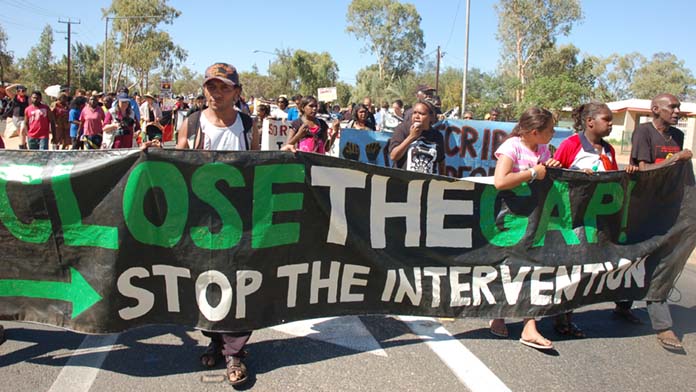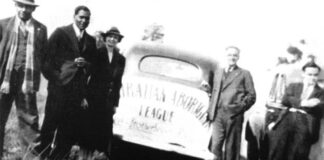The reintroduction of blanket alcohol bans on NT town camps and communities heralds the return of racist Intervention-era controls over Aboriginal people. On 16 February, in a reactionary response to rising crime in Alice Springs, the NT government reimposed alcohol prohibition on people in 344 Aboriginal areas across the territory.
This comes just seven months after people in “alcohol protected areas” (APAs) were released from 15 years of liquor restrictions first imposed under the NT Intervention legislation in 2007, and extended by Labor in 2012 with the Stronger Futures legislation.
Some have claimed the alcohol bans would never have been lifted had there been an Indigenous Voice to parliament.
However, Tangentyere council, the elected representatives of the Aboriginal town camps in Alice Springs, have staunchly resisted alcohol restrictions. Chief executive Walter Shaw says the measures criminalise Aboriginal people based on where they live, and that the council “supports the aspirations of its member and town campers for self-determination and the abolition of punitive, race-based laws.”
Labor and Liberal governments have shown no interest in listening to the voices of local Indigenous people. Billions of dollars have been spent on Intervention measures and on a massive expansion of police, prisons, and child protection in the Territory over 15 years. This has only made Indigenous poverty and disadvantage worse.
NT Intervention
The Intervention decimated communities. Crime and unrest has escalated across central Australia with Indigenous people stripped of a future. “These children are a product of that”, Que Kenny, a Western Arrente woman and human rights activist said, “They are the children of the Intervention who have grown up watching their parents be demonised and rejected.”
There is little doubt alcohol has had an impact on rates of crime, but the sensationalised reporting of “alcohol-fuelled violence” and crime consuming Alice Springs only reinforces the paternalist narrative that says Aboriginal people need to be controlled. It whitewashes decades of neglect and government failure that are the real drivers of crime.
The Intervention saw the Racial Discrimination Act suspended to allow a vicious attack on Aboriginal self-determination.
Compulsory income management saw 50 per cent of welfare recipients’ money quarantined onto a Basics Card, to be spent only on government approved “essentials”.
The Community Development Employment Program (CDEP) employing thousands of Aboriginal people was scrapped, leading to a collapse of community services and an explosion in unemployment. Communities lost control of township land and local community councils were abolished and replaced by mega-shires. Police were given special powers to enter homes and vehicles without a warrant.
Recent media coverage has been reminiscent of the lies about “paedophile rings” operating in Aboriginal communities that justified sending in the military to launch the Intervention.
The mayor of Alice Springs, Matt Paterson, made national headlines in January by calling for the army to again be brought in to restore order: “We need more boots on ground every single day of the year at this stage, until this is addressed.” This was echoed by right-wing politicians including Liberal leader Peter Dutton and NT Senator Jacinta Price who called for federal police intervention.
All this has fuelled racism in Alice Springs. White supremacists have been threatening vigilante violence on Aboriginal youth. The organiser of a 3000-strong meeting said the police should be called on “groups of kids”, and threatened to sue the NT government for allowing the alcohol restrictions to lapse.
Anthony Albanese was forced to fly in to announce a review of the alcohol bans, changes to bottle shop hours, and a $48 million “community safety” package that includes $14.2 million for policing. Within a week the review had recommended reimposing alcohol bans.
On 7 February Albanese pledged an additional $250 million to bolster community services and fund youth diversion and domestic violence programs. But this is a drop in the ocean of what’s needed to address chronic disadvantage and poverty, shocking rates of overcrowding, and surging imprisonment rates.
Labor have shown they cannot be trusted to support Indigenous people in Alice Springs. Their first action was to restore punitive restrictions. The party has also reneged on its promise to end the income management system introduced with the Intervention.
Even the promise to eventually ease alcohol restrictions and introduce “Alcohol Management Plans” in consultation with communities rings hollow. Labor promised this under Stronger Futures, and while multiple communities and town camps negotiated such plans, blanket prohibition remained in force.
Local Aboriginal people have solutions—they have been crying out for funding and Aboriginal control for years. But it will take resistance and organisation to force real action.
By Sarah Thorne






